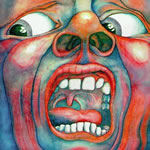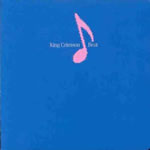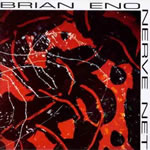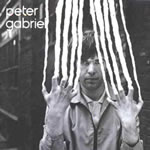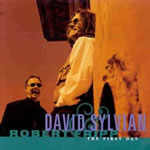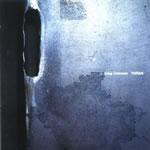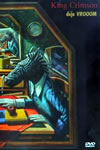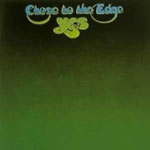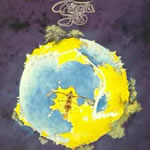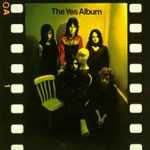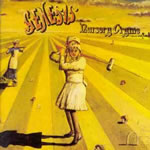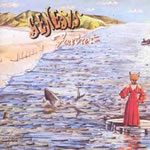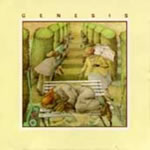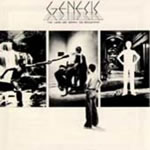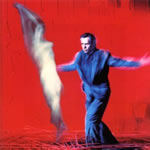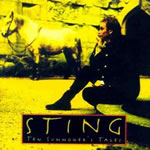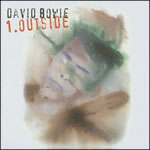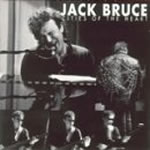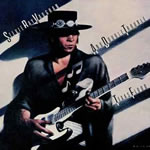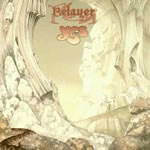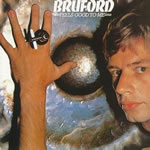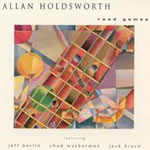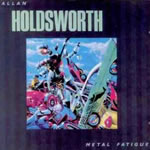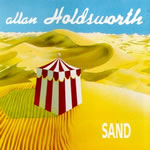The extraordinary Robert Fripp was a leader of the wave of
Progressive guitar players, who began to emerge in 1969. Here were a bunch schooled in the
Blues, but also quite often familiar with Classical guitar. Robert Fripp has been pouring out
wonderful music since his debut with Giles, Giles and Fripp. I will never forget their moving
rendition of
She is Loaded on the BBC’s Colour Me Pop. This comedy band soon
turned very serious as King Crimson, but after one epoch-making album, Fripp was left holding
the band’s name, and very little else (to be fair, he also retained the collaboration of
the excellent lyricist and lighting man, Pete Sinfield, the rest of the band was over the hills
or in ELP).
Fripp constructed, and continues to construct, a series of
dazzling King Crimsons (and a League or two of Crafty Guitarists). His sound is
unmistakable. He is the greatest exponent of electric angst – hear his
Requiem on
Beat, and you hear grief purely and perfectly expressed. He has
produced many positively corruscating solos. Listen to
Distributed Being, on
Eno’s fine
Nervenet, or
Exposure on Peter Gabriel’s second solo
album, or his work with David Sylvian on
The First Day, or King Crimson’s
Thrak, or… well, you get the idea. He has also made many angst-ambient albums
– some with Eno and some not – using his Frippertronics. Chase these at your
peril. He waxes philosophic on the
Digital Global Mobile
website. Probably the only ethical record company in an oxymoronic world.
Since 1981, King Crimson has frequently included the immense
talent of Adrian Belew. Belew is an innovative guitarist – Hendrix would have loved his
similar compulsion to produce pure sounds – and an emotionally charged singer, who
happens to write great songs, and produce some of the most (and indeed only) meaningful lyrics
to be found in Rock music. The guy is literate, but never wordy. The interplay between Belew
and Fripp should be seen as well as heard, luckily it can be, on DVD (with selectable camera
angles, too!) – rush out and buy
Deja Vroom.
The Noise is also a fine
filmed concert.
Yes drummer Bill Bruford was to become Fripp’s long term
collaborator. Yes can boast another of the seminal virtuoso guitar players, too. Steve Howe
has managed to redefine the electric guitar by fusing it into a complete sound (yes,
counterpoint strikes again), as much as by soloing. He was right there at the beginning of
Prog in the band Tomorrow. Howe solos very well, but many Yes pieces are highly successful
interweavings of instruments. For example,
Close to the Edge or
Heart of the
Sunrise. Howe is a devotee of the early Blues rag players, such masters as Lonnie Johnson.
The Clap is a tribute, and an extension, of this lively style, and nods to other
influences, especially Johnson’s some time partner Eddie Lang, and the great Django
Reinhardt.
After several shifts of personnel, Genesis finally stabilised
with Steve Hackett on guitar. Like other Progressive bands, Genesis worked as an ensemble, for
the most part keeping guitar solos brief, and to the point. Hackett’s work on
Nursery Cryme,
Foxtrot,
Selling England by the Pound and
The
Lamb Lies Down on Broadway is quite perfect. Start with
Selling England, where
the production values finally shine (though the earlier albums have remastered well).
The leap from Genesis to Peter Gabriel is easy to make.
Leastways, it was easy for Gabriel to make. Earlier in his career, he invented stage-diving,
which proved a lot harder, as the sheep in the audience hadn’t been properly trained, so
quickly moved out of the way. He has pins in his leg to this day to prove it. As has already
been noted, Fripp worked very successfully with Gabriel. Subsequently, and for many years his
work has incorporated the fine playing of David Rhodes. Certain sidemen give a flavour to
their leaders. Sting has relied on the exquisite playing of Dominic Miller since
Ten
Summoner’s Tales. Reeves Gabrels’s work with Bowie has been staggering at
times – I especially like
Outside. Now Bowie has the great good sense to employ
David Torn.
Progressive Rock is largely seen as a British phenomenon,
apart from Hendrix’s seminal suite
1983, a Merman I Should Turn to Be/ Moon Turn the
Tides (gently, gently away). One noteworthy exception – and I’m not going to
stop shouting about it – was the Oregon band Touch. They appeared briefly in Los Angeles
– the sunshine and smog hometown of The Doors and the Beachboys – making just one
album with Decca, in 1969, which has recently, and marvellously, become available (with five
added tracks). Guitarist Joe Newman managed to make noises still unique to him. He effortlessly
mimics vocal lines, sometimes merging into the voice, makes the guitar growl and whine, and
even squeezes out the occasional trumpet blare. Everyone should have this album.
Seventy-five is one of the greatest of all guitar solos.
The heyday of British Blues players was between 1965 and 1973.
The Band, The Eagles and McLaughlin’s Mahavishnu Orchestra brought that era to an end.
Add The Wailers and Punk, and we see the near exhaustion of a form. Musicians and audiences
wanted something different. Of course, there were other early ’70s players –
listen to Mick Box with Uriah Heap on
Very Heavy, Very Humble, or Caleb Quaye with
Hookfoot, for instance – but the music had been formed. It’s rather like the
continuation of Classical Greek sculpture by the Romans – fine imitations but nothing as
powerful as Praxiteles (I think I got away with that. Didn’t he play with Fields of the
Nephilim?). Gary Moore would become a perfect exemplar of this completed style, as would Stevie
Ray Vaughan. Moore is stunning on Jack Bruce’s 50th birthday party bash,
Cities of
the Heart, where Clem Clemson is also on fine form. Indeed, this album houses some of the
most perfect Blues guitar playing ever recorded. Vaughan died in a helicopter crash after
climbing to the top of the Blues pile. His live gig,
In Session, with his hero Albert
King, is highly rated, as are several of his solo albums, perhaps most notably his first,
Texas Flood. This is exhibition Blues guitar playing at its best. Note the presence
of the legendary producer John Hammond, who promoted talents from Billie Holiday and Count
Basie to Dylan and Springsteen. Vaughan certainly made it to Clapton’s jukebox. Rocking
stuff.
In the mid-70s, Yes came back from the edge after the unique
Relayer (still my favourite Yes album). With the departure of Peter Gabriel, Genesis
too abandoned their more complex beginnings. Progressive Rock seemed to be on the wane, but it
was given a dying boost by two jazzified-rockers: Bill Bruford and Allan Holdsworth. They
played together on Bruford’s very fine first solo album,
Feels Good to Me, and
with John Wetton and Eddie Jobson as UK.
Holdsworth was a revelation. Levels of technical sophistication had become so high that by
the late ’70s it was rare to hear a new guitar sound. Holdsworth was recognisable from
the first. Partly because his technique skirts the boundary of possibility (like McLaughlin o
DiMeola), but mainly because of his unique expressive capability. The electric guitar is
capable of tears, wails, laughter and conversation (hear Hendrix on Rainy Day, Dream
Away on Electric Ladyland for the last two, or Machine Gun for the
first). Holdsworth reaches a pinnacle of intermingled bliss and agony, a feeling evinced by
the finest violinists – such as Itzhak Perlman – when playing Mozart.
Holdsworth should – and will, and must – be the
subject of a complete article. In the meantime, click on to your preferred internet sales
agent, and buy the at last released on CD
Road Games, from 1983 (sponsored by an
admiring Eddie van Halen, and almost drowned by a stupid Warner Bros). And, yes, it is a trio,
so all of the sounds other than the bass – Jeff Berlin on perfect form – and the
drum – Chad Wackerman similarly so – are squeezed from Holdsworth’s guitar.
If you love that – and you should if you have the slightest decency – then listen
to
Metal Fatigue to hear Metal Jazz, or to
Sand to hear some of the most
haunting guitar ever played – on
The 4.15 Bradford Executive and
Pud
Wud. And grab
I.O.U.,
Atavachron,
Secrets,
The Wardenclyffe
Tower,
Hard Hat
Area,
None Too
Soon,
The Sixteen Men of
Tain,
All Night
Wrong and everything else you can get your greedy mits on while you’re about
it. Holdsworth himself warns that he appears on several albums that he would rather not have
appeared on. Take his word for it; after all, he should know.
March2004
